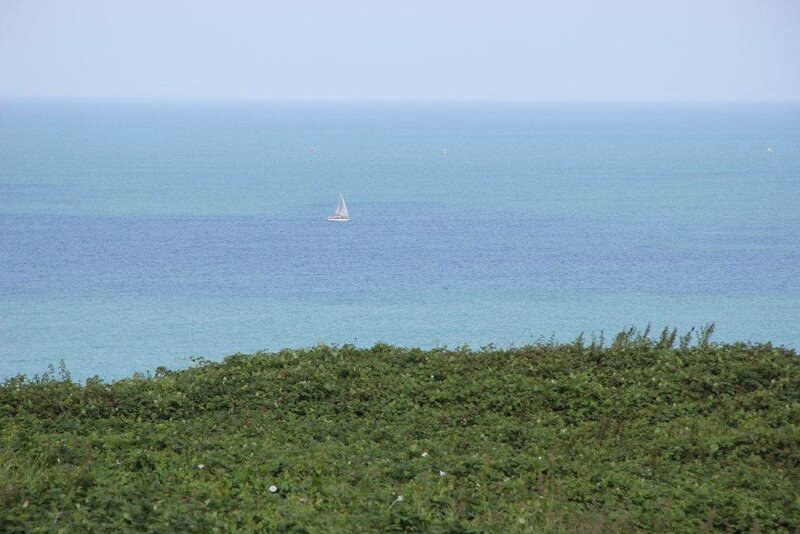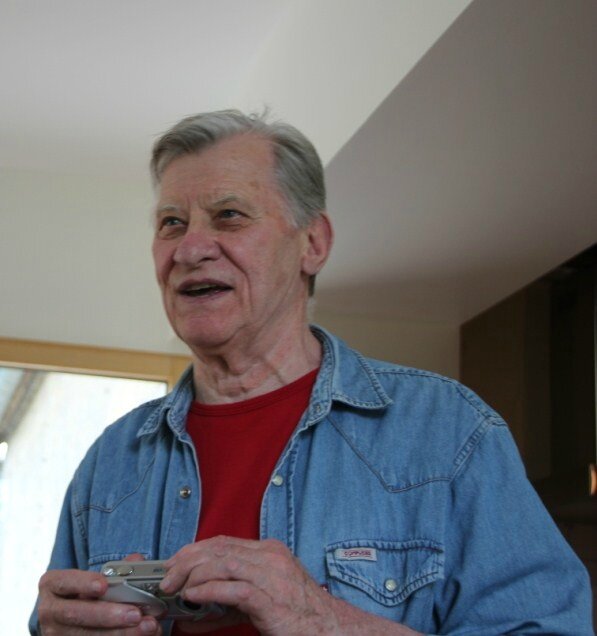Un voilier passe - (I am standing in the sea shore)
À notre cher Tonton Bob
9 juin 1933-14 mars 2014
Il nous faut regarder
Ce qu'il y a de beau
Le ciel gris ou bleuté
Les filles au bord de l'eau
L'ami qu'on sait fidèle
Le soleil de demain
Le vol d'une hirondelle
Le bateau qui revient
(Jacques Brel)
Je suis debout au bord de la plage.
Un voilier passe dans la brise du matin,
et part vers l’océan.
Il est la beauté, il est la vie.
Je le regarde jusqu’à ce qu’il disparaisse à l’horizon.
Quelqu’un à mon côté dit : « il est parti !»
Parti vers où ?
Parti de mon regard, c’est tout !
Son mât est toujours aussi haut,
sa coque a toujours la force de porter
sa charge humaine.
Sa disparition totale de ma vue est en moi,
pas en lui.
Et juste au moment où quelqu’un près de moi
dit : «il est parti !»
il en est d’autres qui le voyant poindre à l’horizon
et venir vers eux s’exclament avec joie :
«Le voilà !»
C’est cela la mort !
Il n’y a pas de morts.
Il y a des vivants sur les deux rives.
(Ce poème est souvent attribué à William Blake (?), à Bishop Charles Henry Brent, ou encore à un anonyme)
“What is dying?
I am standing in the sea shore,
a ship sails to the morning breeze
and starts for the ocean.
She is an object of beauty
and I stand watching her
till at last she fades
on the horizon
and someone at my side says,
‘She is gone.’
Gone! Where?
Gone from my sight--that is all.
She is just as large in the masts, hull and spars
as she was when I saw her,
and just as able to bear her load of living
freight to its destination.
The diminished size and total loss of sight is in me,
not in her;
and just at the moment when someone at my side says,
'she is gone’
there are others who are watching her coming,
and others take up a glad shout--
‘There she comes!’ - and that is dying."
80e anniversaire de Mon Oncle, juin 2013,
Post-scriptum
L’amour commence au point fort de l’attente
L’amour commence au point fort de l’oubli
L’amour commence au point fort du silence
L’amour commence au point fort de l’espoir
Quand tout est fini.
L’amour commence au bord des larmes
Quand tu pars
L’amour commence au bord des stèles
Quand il s’étend vers l’infini.
Erica, Poèmes Chimériques, 1998
(photos Michel Cousin)
http://www.phoenix-ceremonies.co.uk/Funerals/readings_/When_I/Bishop_Brent/bishop_brent.html
http://www.allsaintstupelo.com/whatisdying.htm
http://www.guichetdusavoir.org/viewtopic.php?t=30361
http://teatimeandscones.wordpress.com/2013/04/02/726/
http://www.poemhunter.com/william-blake/poems/page-1/?search
http://www.dansnoscoeurs.fr/robert-gremion/980758
Nathalie Cousin, 16.03.2014






/https%3A%2F%2Fassets.over-blog.com%2Ft%2Fcedistic%2Fcamera.png)
/https%3A%2F%2Fstorage.canalblog.com%2F48%2F50%2F315838%2F112171532_o.jpg)
/https%3A%2F%2Fassets.over-blog.com%2Ft%2Fcedistic%2Fcamera.png)
/https%3A%2F%2Fstorage.canalblog.com%2F95%2F16%2F315838%2F111204390_o.jpg)
/https%3A%2F%2Fstorage.canalblog.com%2F03%2F62%2F315838%2F101196636_o.jpg)
/https%3A%2F%2Fstorage.canalblog.com%2F65%2F53%2F315838%2F96284632_o.jpg)